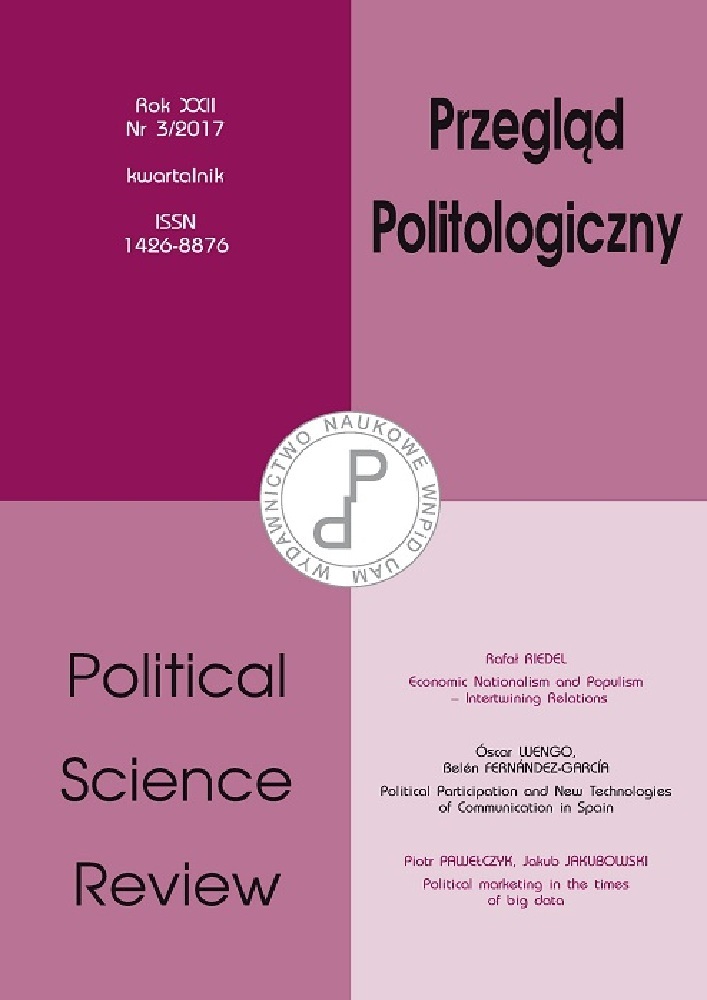Abstrakt
Zasadniczym celem artykułu jest przedstawienie problemów związanych ze stosowaniem podejścia feministycznego w badaniach nad bezpieczeństwem. Punkt wyjścia stanowią kwestie związane z podstawowymi terminami w obrębie zróżnicowanej wewnętrznie teorii feministycznej i ich zastosowania w obszarze nauk o polityce. Podjęto również próbę określenia celów wybranych badań feministycznych, które mogą być wykorzystane w analizie problemów z zakresu bezpieczeństwa wewnętrznego i międzynarodowego. Główną tezą artykułu jest stwierdzenie, że w badaniach nad bezpieczeństwem dominują przypisane płci stereotypy i znaczenia wpisujące się w tzw. męskie spojrzenie.Bibliografia
Agaciński S. (2000), Polityka płci, tłum. M. Falski, Wydawnictwo KR, Warszawa.
Alison M. (2004), Women as Agents of Political Violence: Gendering Security, “Security Dialogue”, vol. 35, no. 4.
Basow S. A. (1992), Gender Stereotypes and Roles, Books/Cole, Pacific Grove.
Bator J. (2001), Feminizm, postmodernizm, psychoanaliza. Filozoficzne dylematy feministek drugiej fali, Słowo/obraz terytoria, Gdańsk.
Burguieres M. K. (1990), Feminist Approaches to Peace: Another Step for Peace Studies, “Millennium: Journal of International Studies”, vol. 19, no. 1.
Butler J. (2005), Subjects of Sex/Gender/Desire, in: Feminist Theory: A Philosophical Anthology, eds. A. E. Cudd, R. O. Andereasen, Blackwell Publishing, Malden MA.
Chowdhry G., Nair S. (2002), Power, Postcolonialism and International Relations. Reading Race, Gender and Class, Routledge, London–New York.
Czaputowicz J. (2007), Teorie stosunków międzynarodowych. Krytyka i systematyzacja, Wydawnictwo Naukowe PWN, Warszawa.
Elshtain J. B. (1987), Women and War, Basic Books, New York.
Enloe C. (2007), Globalization & Militarism: Feminists Make the Link, Rownam & Littlefield Publishers, Lanham–Boulder–New York–Toronto–Plymouth.
Grosz E. A. (1988), The In(ter)vention of Feminist Knowledges, in: Crossing Boundaries: Feminism and the Critique of Knowledges, eds. B. Caine, E. A. Grosz, M. de Lepervanche, Allen and Unwin, Sydney.
Harding S. (1987), Introduction: Is There a Feminist Method?, in: Feminism & Methodology: Social Science Issues, ed. S. Harding, Indiana University Press, Bloomington–Indianapolis.
Hartsock N. (1979), Feminist Theory and the Development of Revolutionary Strategy, in: Capitalist Patriarchy and the Case for Socialist Feminism, ed. Z. R. Eisenstein, Monthly Press Review, New York.
Jacques K., Taylor P. J. (2013), Myths and Realities of Female-perpetrated Terrorism, “Law and Human Behavior”, vol. 37.
Janis I. L. (1989), Crucial Decisions. Leadership in Policymaking and Crisis Management, The Free Press, New York.
Jones A. (1996), Does the ‘Gender’ Make the World Go Round? Feminist Critiques of International Relations, “Review of International Studies”, vol. 22, no. 4.
Lentner H. H. (1974), Foreign Policy Analysis: A Comparative and Conceptual Approach, Charles E. Merrill Publishing Company, Columbus.
Light M., Halliday F. (1994), Gender and International Relations, in: Contemporary International Relations: A Guide to Theory, eds. A. J. R. Groom, M. Light, Pinter Publishers, London.
Merz F. (1979), Geschlechterunterschiede und ihre Entwicklung, Ergebnisse und Theorien der Psychologie, Verlag für Psychologie, Göttingen.
Mies M. (1983), Towards a Methodology for Feminist Research, in: Theories of Women’s Studies, eds. G. Bowles, R. D. Klein, Routledge and Kegan Paul, London.
Millett K. (2005), Theory of Sexual Politics, in: Feminist Theory: A Philosophical Anthology, eds. A. E. Cudd, R. O. Andereasen Blackwell Publishing, Malden MA.
Ortner S. B. (1974), Is female to male as “nature” to “culture”, in: Women, Culture and Society, eds. M. Z. Rosaldo, L. Lamphere, Standford University Press, Standford.
Peach L. J. (1993), Women at War: The Ethics of Women in Combat, Indiana University Press, Bloomington.
Peterson V. S. (1992), Transgressing Boundaries: Theories of Knowledge, Gender and International Relations, “Millennium: Journal of International Studies”, vol. 21, no. 2.
Reinharz S. (1979), On Becoming a Social Scientist: From Survery Research ad Participant Observation to Experimental Analysis, Jossey-Bass, San Francisco.
Ruddick S. (1989), Maternal Thinking Toward a Politics of Peace, Ballantine Books, New York.
Ruddick S. (1998), ‘Woman of Peace’. A Feminist Construction, in: The Women and War Reader, eds. L. A. Lorentzen, J. Turpin, New York University Press, New York.
Shepherd L. J. (2010), Feminist Security Studies, in: The International Studies Encyclopedia, ed. R. A. Denemark, Blackwell Publishing, Oxford.
Stoller R. J. (1968), Sex & Gender: On The Development of Masculinity and Feminity, Science House, New York.
Stump J. L., Dixit P. (2013), Critical Terrorism Studies: An introduction to research methods, Routledge, London–New York.
Sylvester Ch. (1994), Feminist Theory and International Relations in the Post-Modern Era, Cambridge University Press, Cambridge.
Ślęczka Ś. (1999), Feminizm. Ideologie i koncepcje współczesnego feminizmu, Wydawnictwo “Książnica”, Katowice.
Tickner J. A. (1997a), You just Don’t Understand: Troubled Engagements between Feminists and IR Theorists, “International Studies Quarterly”, vol. 41, no. 4.
Tickner J. A. (1997b), Re-visioning Security, in: International Relations Theory Today, eds. K. Booth, S. Smith, Polity Press Cambridge.
True J. (1996), Feminism, in: Theories of International Relations, S. Burchill, A. Linklater (et al.), Macmillan Press Ltd, New York.
Verba S. (1961), Assumptions of Rationality and Non-Rationality in Models of the International System, in: International Politics and Foreign Policy: Reader in Research and Theory, ed. J. N. Rosenau, The Free Press of Glencoe, New York.
Walt S. M. (1991), The Renaissance of Security Studies, “International Studies Quarterly”, vol. 35, no. 2.
Wesley J. K. (2006), Considering the Context of Women’s Violence: Gender Lived Experiences and Cumulative Victimisation, “Feminist Criminology”, vol. 1, no. 4.
Wibben A. T. R. (2011), Feminist Security Studies: A Narrative Approach, Routledge, London–New York.
Yuval-Davis N. (1997), Gender and Nation, Sage, London.
Yuval-Davis N.(1999), What is ‘Transversal Politics’?, “Soundings”, Issue 12.
Zięba A. (2016), Płeć terroryzmu – wprowadzenie do zagadnienia, Kwartalnik Naukowy OAP UW “e-Politikon”, no. 20.
